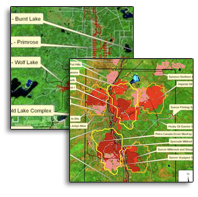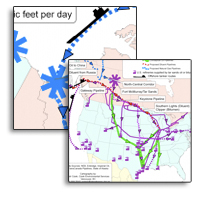Tar Sands 101
The Tar Sands "Gigaproject" is the largest industrial project in human history and likely also the most destructive. The tar sands mining procedure releases at least three times the CO2 emissions as regular oil production and is slated to become the single largest industrial contributor in North America to Climate Change.
The tar sands are already slated to be the cause of up to the second fastest rate of deforestation on the planet behind the Amazon Rainforest Basin. Currently approved projects will see 3 million barrels of tar sands mock crude produced daily by 2018; for each barrel of oil up to as high as five barrels of water are used.
Human health in many communities has seriously taken a turn for the worse with many causes alleged to be from tar sands production. Tar sands production has led to many serious social issues throughout Alberta, from housing crises to the vast expansion of temporary foreign worker programs that racialize and exploit so-called non-citizens. Infrastructure from pipelines to refineries to super tanker oil traffic on the seas crosses the continent in all directions to allthree major oceans and the Gulf of Mexico.
The mock oil produced primarily is consumed in the United States and helps to subsidize continued wars of aggression against other oil producing nations such as Iraq, Venezuela and Iran.
To understand the tar sands in more depth, continue to our Tar Sands 101 reading list
Tar sands industry fights back
Oil sands industry fights back
Criticism piles up
By Yadullah Hussain, Financial Post November 15, 2013
As withering criticism of the oil sands continues unabated, the industry is fighting back, armed with its own set of facts and highlighting the strides made in tackling the environmental issues that have sullied its reputation.
Quebec premier defends [Energy East] pipeline
Quebec premier defends [Energy East] pipeline
CARLETON-SUR-MER, Que. - Quebec Premier Pauline Marois has defended a pipeline project that would see Western Canadian oil pumped across her province.
Marois says the controversial Enbridge Inc. proposal to reverse the flow of one of its pipelines could be a boon for Quebec — particularly since it would supply oil refineries in Montreal.
Speaking to reporters Thursday, she said the Alberta crude would be cheaper than oil purchased from abroad.
Oil-by-rail shift squeezing plans for new pipelines — including Keystone
Oil-by-rail shift squeezing plans for new pipelines — including Keystone
Jeff Lewis | 13/08/30
Financial Post
CALGARY • The tug-of-war between railroads and pipelines in North American oilfields is only just getting started.
In recent months, the popularity of moving crude on tracks has sapped commercial support for new pipelines from oil fields in West Texas to North Dakota’s Bakken. Now it’s raising questions about the importance of Keystone XL, TransCanada Corp.’s controversial project designed to connect Alberta’s booming oil sands to refineries on the U.S. Gulf Coast.
Keystone XL: Two conflicting truths (Macleans blog)
Keystone XL: Two conflicting truths
by Erica Alini on Thursday, August 29, 2013
Joshua Roberts/Reuters
Where oil meets water: The final stop for the Energy East pipeline
Where oil meets water: The final stop for the Energy East pipeline
SHAWN McCARTHY - GLOBAL ENERGY REPORTER
SAINT JOHN, N.B. — The Globe and Mail
Published Saturday, Aug. 31 2013
On a point of land jutting into the open waters of the fabled Bay of Fundy, Canada’s long-sought ambition to become a global oil exporter is coming into focus.
Here at Mispec Point, Irving Oil Ltd. and TransCanada Corp. plan to build a $300-million, deep-water marine terminal that would give Western Canadian crude producers their highly coveted direct access to world markets.
New pipeline plan can’t obscure Keystone XL failure
New pipeline plan can’t obscure Keystone XL failure: Tim Harper
The politicization of the Keystone XL pipeline proposal threatens damage to Canada-U.S. relations, even before the decision.
Prime Minister Stephen Harper has raised the issue of the Keystone XL pipeline with U.S. President Barack Obama at every turn, to apparently little effect, writes Tim Harper.
By: Tim Harper
National Affairs, Published on Thu Aug 01 2013
TransCanada to build oil pipeline to Atlantic Coast
TransCanada to build oil pipeline to Atlantic Coast
By Rob Gillies / The Associated Press
August 1, 2013
Portland Press Herald
TORONTO — Pipeline company TransCanada said Thursday it will go ahead with a $12 billion plan to ship 1.1 million barrels of oil per day from Western Canada to the country's Atlantic coast that would replace foreign oil in Eastern Canada and allow for Canadian crude to be exported to Asia and Europe.
Enbridge to build $1.3 billion tar sands pipeline extension
Enbridge to build $1.3 billion oil sands pipeline extension
By Jordan Howell
Jul 28, 2013
Canadian pipeline company Enbridge announced plans to build a US $1.3 billion southern extension to its Northern Alberta Woodland oil pipeline to connect the company’s Cheecham Terminal to its Edmonton Terminal and nearby refineries.
The extension will serve Imperial Oil's Kearl oil sands project located in the Athabasca Oil Sands region about 70 kilometers north of Fort McMurray and is planned to be in service by the third quarter of 2015.
Say NO to TransCanada's "Energy East" TarSands Pipeline
UPDATE August 1st 2013: TransCanada has announced they intend on moving forward with their Energy East Pipeline and have unfortunately even added to its capacity, making it now a 1.1 million barrel per day project.
Be sure to bring your concerns and your friends to the public engagement meetings TransCanada is hosting.
A Black Mound of Canadian Oil Waste Is Rising Over Detroit
A Black Mound of Canadian Oil Waste Is Rising Over Detroit
WINDSOR, Ontario — Assumption Park gives residents of this city lovely views of the Ambassador Bridge and the Detroit skyline. Lately they’ve been treated to another sight: a three-story pile of petroleum coke covering an entire city block on the other side of the Detroit River.
The New York Times
By IAN AUSTEN
Published: May 17, 2013
Detroit’s ever-growing black mountain is the unloved, unwanted and long overlooked byproduct of Canada’s oil sands boom.



